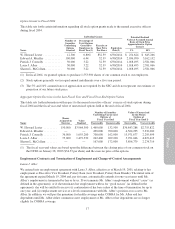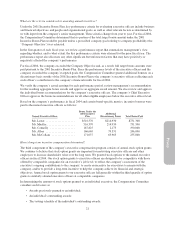Pottery Barn 2004 Annual Report Download - page 96
Download and view the complete annual report
Please find page 96 of the 2004 Pottery Barn annual report below. You can navigate through the pages in the report by either clicking on the pages listed below, or by using the keyword search tool below to find specific information within the annual report.
• Review, make recommendations to the Board regarding, and approve, as appropriate, compensation for
executive officers other than the Chief Executive Officer. Each of the named executive officers is listed in
the Summary Compensation Table appearing in this Proxy Statement;
• Review, make recommendations to the Board regarding, and approve, as appropriate, general
compensation goals and guidelines for the company’s employees;
• Review, make recommendations to the Board regarding, and approve, as appropriate, the compensation
policy for the non-employee directors of the company; and
• Act as the administrator of and administer, within the authority delegated by the Board, the company’s
incentive compensation and equity-based plans.
Does the Compensation Committee delegate any of its authority?
The Compensation Committee does not delegate any of its authority with respect to executive officers and non-
employee directors of the company. However, the Compensation Committee has appointed a Non-Executive
Stock Option Committee to which it has delegated the ability to grant awards under the company’s equity based
plans to those employees who are not executive officers. The Non-Executive Stock Option Committee consists of
two of the company’s directors, Edward A. Mueller and Patrick J. Connolly.
What is the Compensation Committee’s philosophy of executive compensation?
We believe that the company’s executive compensation programs should support the company’s objective of
creating value for its shareholders. Accordingly, we believe that executive officers and other key employees
should have a significant stake in the company’s stock performance and that compensation programs should link
executive compensation to shareholder value. For this reason, we strive to ensure that the company’s executive
officer compensation programs are designed to enable the company to attract, retain, motivate and reward highly
qualified executive officers while maintaining strong and direct links between executive pay, individual
performance, the company’s financial performance and shareholder returns. One of the ways we have sought to
accomplish this is by making a significant portion of individual compensation directly dependent on the
company’s achievement of financial goals, and by providing significant rewards for exceeding those goals. We
believe that strong financial performance, on a sustained basis, is an effective means of enhancing long-term
shareholder return.
What are the components of executive compensation?
We consider three major elements in our compensation program:
• Base salary;
• Annual incentive opportunities; and
• Long-term incentives.
We believe that offering the executive team a total compensation package with a strong at-risk, pay-for-
performance component helps to achieve the company’s objective of creating value for its shareholders. Each of
the three major elements in our compensation program is discussed in detail below, but in general this means:
• Base salaries are competitive with comparable public retail companies relative to similar positions.
• Annual incentive opportunities are based principally on the company’s overall corporate performance and
the executive’s attainment of individual goals. This results in the company’s strongest performers
receiving a better compensation package while poorer performers receive less. We believe the structure of
our annual incentive opportunities fosters a performance-driven culture.
• Long-term incentives, such as equity compensation awards, are structured to encourage our executive
team to manage from the perspective of owners in the company and to reward executives and other key
employees for maximizing long-term shareholder value.
19
Proxy
























